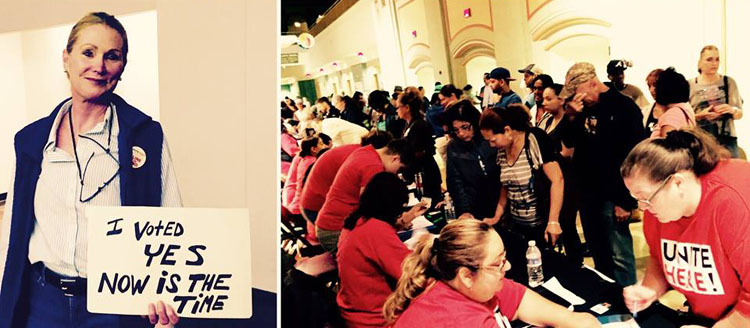Thousands of Atlantic City casino workers have authorized a July 1 walk-off – on casino’s biggest holiday weekend of the year – if they don’t have a new contract in hand by then.
According to a Unite Here news release, 96 percent of the workers from Atlantic City’s Tropicana, Bally’s, Harrah’s, and Caesars voted on Thursday to authorize the strike if the July 1 deadline isn’t met. A strike against the Trump Taj Mahal had had already been authorized last year by its employees. Billionaire Carl Icahn controls both the Taj Mahal and Tropicana after acquiring them in bankruptcy.
Casino workers say the $2.5 billion gaming industry should be helping Atlantic City to recover, not ripping off taxpayers by holding down wages and forcing longtime employees to join public assistance rolls. Workers say that at a time when casinos are reaping the benefits of the highest operating profit in a decade, the average pay remains below the cost of living at $11.74 per hour. UNITE HERE Local 54 President Bob McDevitt said, “To me the most insulting thing is that in 2011 this union gave up part of its package to help the casinos when they were struggling,” according to the Associated Press.
Atlantic City casinos gross more during the months of July and August than any other time of the year, with higher room rates and rooms being fully booked. So Thursday’s vote means that of the city’s remaining eight casinos, five of them could be affected in time for the July 4 holiday weekend. The city’s other three casinos, Golden Nugget, Borgata, and Resorts won’t be affected due to an indefinite extension that the union has given them.
The union’s vote comes at a time when the state is trying to deal with a slew of issues, the most daunting of which is the $100 million budget shortfall and the ongoing battle between it Atlantic City over a possible takeover. Meanwhile, older casinos in Pennsylvania, Connecticut, and New York already draw gamblers away from the Garden State, and if the referendum to allow two new casinos in North Jersey is successful in November, Atlantic City’s exclusivity rights, which it has enjoyed since casinos were legalized there in 1976, are over.
McDevitt said that the day before the union voted on the strike a five-year salary freeze was offered by the Tropicana. Tony Rodio, the president of Tropicana said that he hopes his employees “remain mindful” of the efforts on the part of the casino over the past five years. Rodio said, “With over $160 million invested at Tropicana Atlantic City since 2011, our employees have benefited from increased hours, increased gratuities, and job security while 33 percent of the market’s 12 casinos have been forced to close and thousands have lost their jobs.” He added, “It should also be noted that since emerging from bankruptcy in 2010, current ownership has not withdrawn one penny of investment from Tropicana Atlantic City while continuing to risk millions in an uncertain market, the Associated Press reported.
In an email to Reuters after the vote on Thursday, Stephen Cohen, spokesman for Caesars, said, “Our goal remains to negotiate a fair resolution to keep our employees at work and to continue supporting Atlantic City’s revitalization, which has our full support,” echoing his earlier comments on Thursday. Two of the properties affected by Thursday’s vote, Caesars Atlantic City and Bally’s Atlantic City, are owned by the unit of Caesars that are in bankruptcy, Caesars Entertainment Operating Company Inc.
McDevitt said that in pay and benefits, UNITE HERE workers on average have surrendered $1,500 a year to help casinos make it through the difficult times in the industry. He said that casino workers were angry with tough work rules and an average pay of about $25,000 per year, according to a Market Watch report. McDevitt said that unless an acceptable offer is made by the casinos, the strike that will put between 5,000 and 6,000 casinos employees on the picket lines, will continue throughout the summer. He added that there was little progress made when negotiations began towards the end of May. McDevitt also noted that in 2004, a 34-day strike resulted in casinos losing $60 million in revenue.



